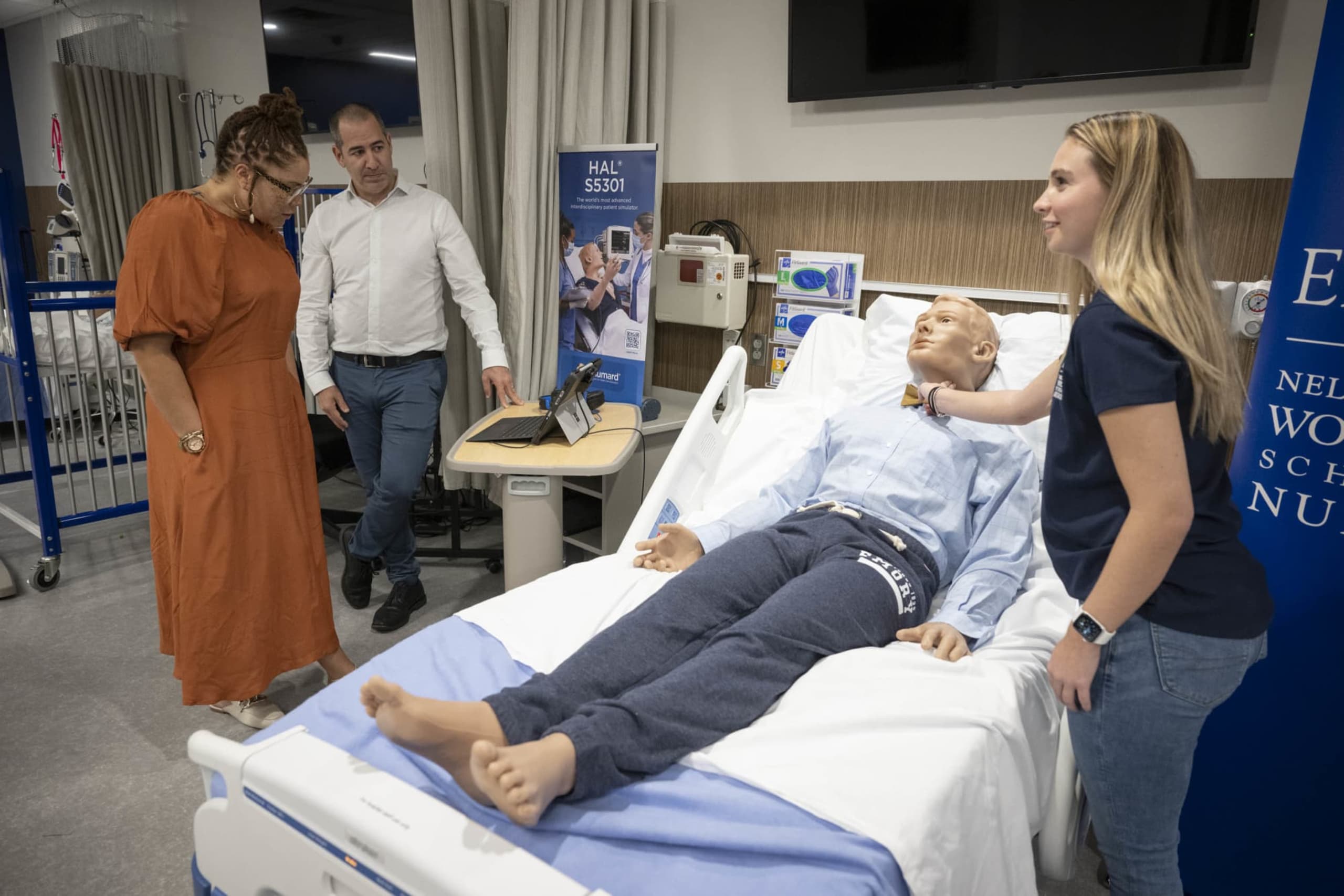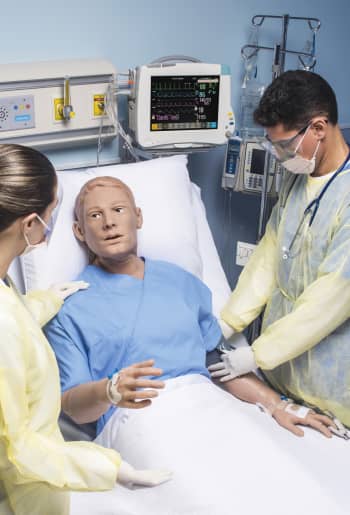This Fall, Nursing Students in Georgia Will Test the World’s Most Advanced AI Robot Patient
Reporter
Editor & Writer
Reporter
Editor & Writer

- Emory HAL is billed as the most advanced patient simulator available today and will enter classrooms for the first time this fall at Emory University's school of nursing.
- The AI-equipped robot mannequin will help nursing students prepare for and transition to real-world clinical practice.
- The simulator's $160,000 cost is several times that of other patient simulators currently on the market.
Students and faculty at Nell Hodgson Woodruff School of Nursing at Emory University in Atlanta will meet a new patient next semester. Emory HAL, a patient simulator equipped with artificial intelligence (AI), can speak, move, and mimic patient symptoms with almost perfect accuracy. (HAL stands for Hybrid Assistive Limb, meaning a robot with a powered exoskeleton.)
Emory HAL arrived at the school in September from Gaumard, a healthcare simulation company that partnered with the school to create the prototype, which a company statement called "the world's most advanced interdisciplinary patient simulator." Gaumard collaborated on the project with the Emory Nursing Learning Center.
Also known as the HAL S5301 patient simulator, Emory HAL is an AI-driven robot patient that can replicate a vast array of human physiological reactions and conversational or emotional behaviors.
According to school officials, Emory HAL's ability to speak and replicate physiologic conditions sets him apart from traditional patient simulators. Emory HAL has realistic facial expressions and can lift his arms and move his eyes. By drooping his face and changing his eye movements, for example, the robot can simulate a stroke victim. Faculty members can program specific scenarios or encounters, but Emory HAL can also build his own vocabulary and carry his own conversation.

"He has a voice; it sounds real. He really blurs the line between simulation and real life," Beth Ann Swan, the school's associate dean and vice president for academic practice partnerships and the Evans endowed distinguished chair in simulation and innovation, told BestColleges.com. "It just helps suspend that reality. You forget you're not talking to a human being."
A key component of the school's 70,000-square-foot, $20 million expansion, the learning center features a state-of-the-art simulation and skills lab and new continuing professional education capacities. While Emory HAL has yet to start his job as a robot patient, he helped greet visitors at the center's recent open house.
"When we did our open houses, Emory HAL was kind of the feature because he could literally welcome people to the center," Swan said. "People would come in, and he'd say, 'Welcome to the Emory Nursing Learning Center.'
"People were like, 'What?'"
According to Swan, the center's overarching goal is to simulate hospital and ambulatory care settings. So, Emory's simulation team identified the latest tech on the market.
Emory began planning the center in 2020, and two years later the school reached out to Gaumard to discuss the possibility of a HAL robot.
Although official price quotes for patient simulators are often only available through individual consultation, an informal analysis of publicly available price points found an approximate range between $1,000 and $50,000.
Swan deferred to Gaumard for pricing, who declined to provide cost for the Emory HAL, but local media outlets reported the cost at $160,000.
"We're always asking, 'What's the next thing we need to be doing to foster excellence for our students, to give them the best experience so they're ready to take care of humans in education, teaching, and clinical practice?'" Swan said.

This is more than mere trickery for the open-house crowd. Emory HAL's capabilities allow for more realistic and effective simulations for nursing students, with ever-changing details that reflect the dynamic world of patient care.
"It's not all about, 'Oh, you're here for a headache today,'" Swan said. "It's like, 'Well, who do you live with?' Sometimes [HAL] has two sisters and a dog. Other times he's got a brother and a cat.
The humanness that he brings to the experience, I think, is really where we see the value with our nursing students."
Walking into an intensive or critical care unit can be scary for anyone. So the opportunity to interact with Emory HAL within the learning center can help students gain familiarity with all facets of the experience, allowing for a smoother transition to those settings after graduation.
Swan compared the virtual hospital and ambulatory care center to an immersive flight simulator. Preparing nurses with realism can help foster safer, higher-quality care down the road.
Between now and the start of the fall semester, Swan and other school leaders are working to identify the proper workload for faculty, prepare students for the technology, and find Emory HAL's best fits within the curriculum.
Swan said incorporating Emory HAL is another critical step toward the future.
Emory HAL and the learning center are part of the school's commitment to identifying and responding to trends as proactively as possible — an increasingly important skill as technology continues to shape nursing education and clinical care settings.
Referring to a quote often associated with hockey legend Wayne Gretzky, Swan said of the new advancements:
"I don't need to know where the puck is. I need to know where it's going."
















